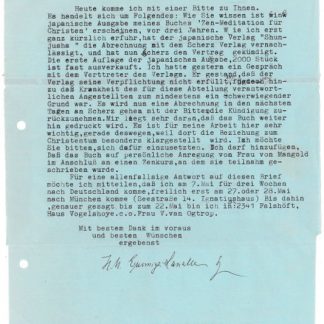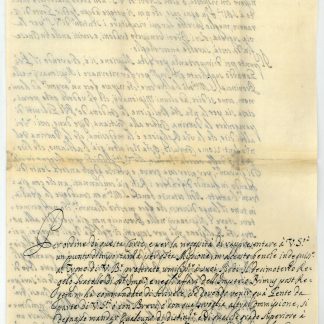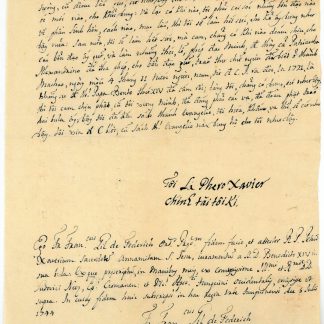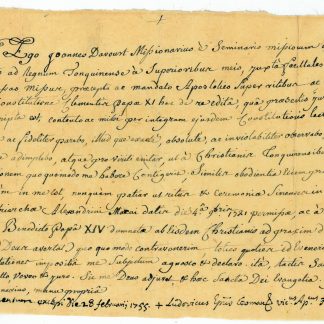A missionary and diplomate in the Paris Foreign Missions Society
Autograph document signed. Co-signed by the Vicar Apostolic of Western Tonkin, Louis Néez.
Oblong 8vo. 1 p. In Latin on rice paper.
€ 2,500.00
An oath renouncing the practice of the Chinese rites taken by the prominent member of the Paris Foreign Missions Society (M.E.P.) and later bishop as required by the Papal Bull "Ex Quo Singulari" (1742). The oath was sworn on the Bible, and a signed autograph ("manu propria") of the formula had to be produced as evidence. Most of these documents are co-signed by church officials or superior friars as witnesses to an oath sworn in their presence ("in manibus meis"), in this case Davoust's predecessor as Vicar Apostolic of Western Tonkin, bishop Louis Néez (1680-1764).
Born in Mayenne, Davoust studied at the famous Saint-Sulpice Seminary and entered the Paris Foreign Missions Seminary in February 1753, where he was ordained in September that year. Less than a month later, Davoust left for Western Tonkin, where bishop Louis Néez discovered his talents. In 1759, Néez sent Davoust on a mission to Rome in order to negotiate the jurisdiction of missionaries from different congregations over the districts of Vietnam. Davoust petitioned with the Propaganda Fide and Pope Clement XIII and succeeded in attaining sole jurisdiction of the M.E.P. over all the districts in the western part of Western Tonkin, while the Jesuits were assigned the southern parts thereof. Several diplomatic missions for the M.E.P. in Rome and at the court in Versailles would follow over the course of Davoust's life. In 1771 he was named coadjutor to Néez's successor Betrand Reydellet, whom he would succeed as Vicar Apostolic of Western Tonkin in 1780. Largely forgotten today, Davoust was arguably the most influential M.E.P. missionary of the 18th century.
During the early years of their mission to East Asia, the Jesuits led by Matteo Ricci accommodated Catholicism to Chinese customs and Confucian practice in important ways, both for political reasons and in the hope of attracting more converts. Criticism of this syncretism is as old as the Chinese rites themselves, and Ricci's direct successor Niccolò Longobardo attempted to change course, which led to his replacement as provincial. When Dominican and Franciscan missionaries entered China, they reported to Rome critically on the Jesuit practices. A first condemnation was decreed by Pope Clement XI in 1704 and confirmed in the 1715 Bull "Ex Illa Die". In "Ex Quo Singulari", Pope Benedict XIV re-affirmed "Ex Illa Die" and required all missionaries in East and South-East Asia to take the oath renouncing the practice of Chinese rites and similar accommodations to local beliefs and religious practice.
A transcription and translation of the document are available on request.
Well preserved.






